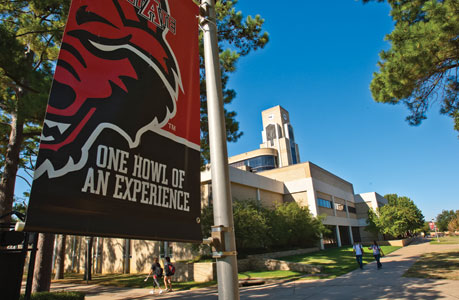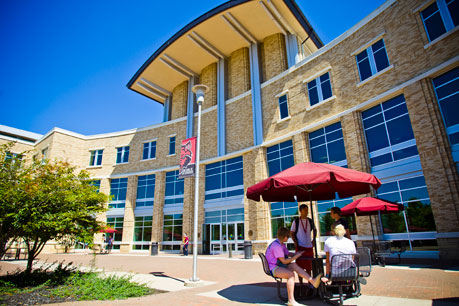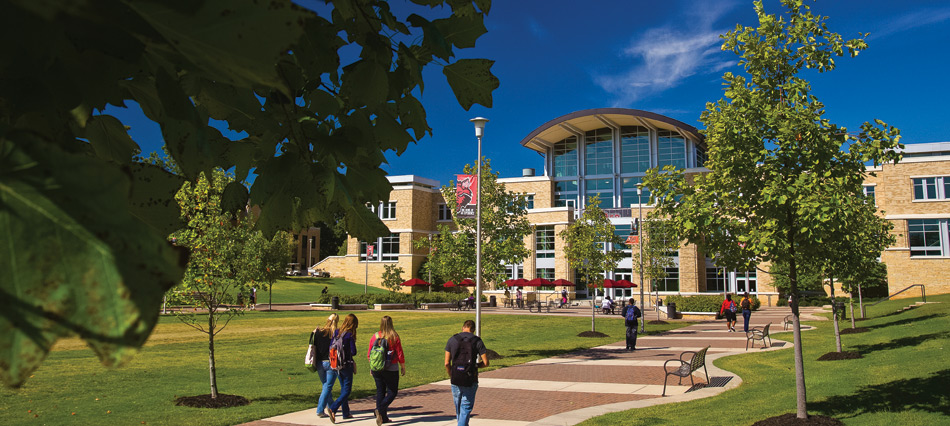We’re in the heart of the Mid-South with roots in the rich cultural mix of the Delta. We honor our past while looking to the future. We enjoy our central location but look to the world. We take pride in the diversity of our faculty, staff and students, while taking time to value each individual. We are a work in progress that’s been a century in the making.
Marking its first hundred years, Arkansas State University continues to expand in exciting ways. It’s growing to serve the region, state and nation – with a global perspective. By providing a solid educational base, the university prepares students for leadership as professionals and in their communities.
Arkansas State University developed from an agricultural school founded on April 1, 1909 by Act 100 of the 37th Arkansas General Assembly. It was created as one of four Arkansas high schools to teach agriculture, horticulture and the art of textile manufacturing. Today, the university grants bachelor’s, master’s and doctoral degrees through 11 degree granting colleges. With cutting-edge research capabilities, Arkansas State is building on its first hundred years and looking to the future.
A-State aspires to be known by our commitment to diversity as evidenced by our inclusive work and learning environment, our acceptance of differences as positive and enriching, and our ability to attract, retain, and advance a diverse faculty, staff, and study body. Our actions are guided by the following Core Diversity Areas (DCAs):
Build new institutional diversity infrastructure
· Conduct a diversity climate survey to determine institutional priorities
· Establish a diversity council and affinity groups to provide opportunity for interaction and “free” expression
· Establishing procedures for requesting Diversity Office funds
Enhance structural diversity, equity, and success
· Institute a formal succession planning process to identify and prepare high-performing faculty to take on leadership roles (e.g., chairs, deans, etc.)
· Ensure faculty have the necessary KSAOs to move into upper level positions
· Work with student groups to ensure underrepresented students are on par with majority students regarding recruitment, retention, and graduation rates
Inform the search process
· Participate in various stages of the search process (e.g., reviewing applicant and interview pools) to ensure fairness and consistency
· Train faculty who serve on search committees on the search process and matters of diversity
· Develop a list of recommended recruiting sources to ensure a diverse applicant pool
Cultivate diversity awareness, recognition, and appreciation
· Initiate campus-wide diversity training
· Elevate diversity competence as one the faculty pillars of excellence
Interface with institutional accountability systems
· Advocate for diversity achievements in performance review process
· Outline diversity actions in annual reports
· Establish key employment ratios
Infuse diversity into the curricula
· Work with faculty to build “touchpoints” for diversity into courses that may not have a traditional diversity focus
· Offer relational training to all students
Agriculture and Technology
Agriculture Business
Animal Science
Crop Consulting and Agronomic Services
Horticulture
Plant Science
Spatial Technologies and Geographic Information Systems
Renewable Energy
Business
Accounting
Computer & Information Technology
Economics
Electronic Commerce
Entrepreneurship
Finance
General Business
International Business
Logistics
Management
Marketing
Education & Behavioral Science
Early Childhood Education
Educational Leadership
Physical Education
Psychology and Counseling
Reading
School Counselling
School Psychology
Sport Administration
Sports Management
Engineering
Civil Engineering
Electrical Engineering
Engineering Management
Mechanical Engineering
Fine Arts
Art
Art History
Graphic Design
Music
Theatre
Humanities & Social Sciences
English
Geography
History
Philosophy
Political Science
Public Administration
Social Science
Sociology
Media & Communication
Communication Studies
Creative Media Production
Multimedia Journalism
Strategic Communication
Nursing & Health Professions
Physical Therapy
Health Science
Nursing
Social Work
Sciences & Mathematics
Biology
Chemistry & Physics
Computer Science
Environmental Sciences
Mathematics & Statistics
Molecular Biosciences
Undergraduate
IELTS – 6.0
TOEFL – 61
Graduate
IELTS – 6.5
TOEFL – 79




2014 © a2fairs. All Rights Reserved. powered by twopulse.com